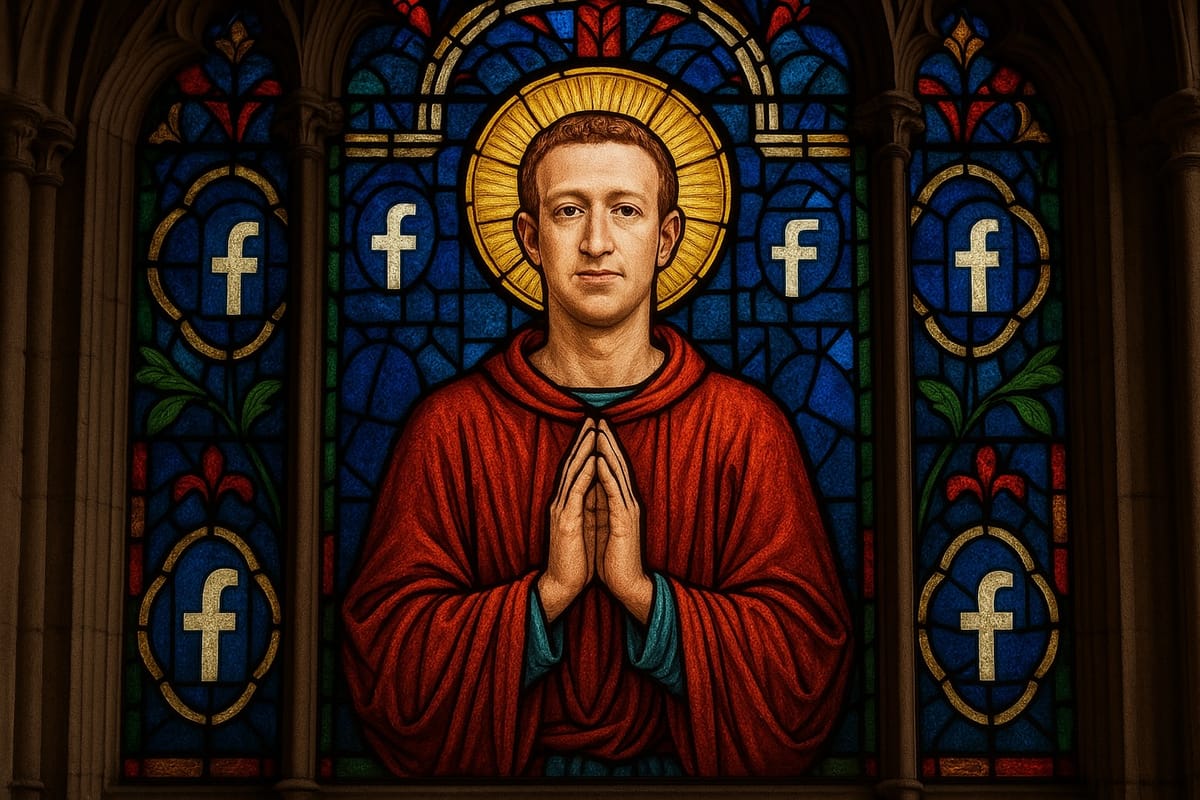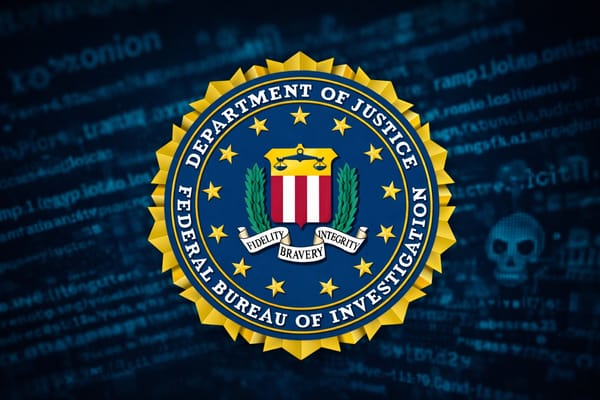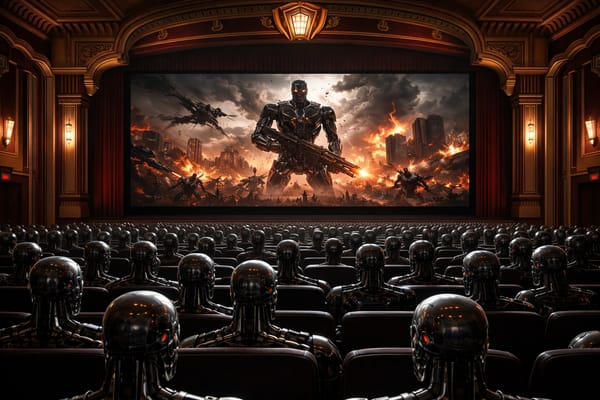"Superintelligence and a new era of personal empowerment": The AI gospel according to Mark Zuckerberg
Billionaire confronts zealots who believe AI should "automate all valuable work" and feed humanity "on a dole of its output".

With a net worth of almost $250 billion and a supervillain-style home that's absolutely not equipped with a doomsday bunker, Mark Zuckerberg is hardly what you would usually describe as a man of the people.
But the billionaire Facebook founder appears to have had a road-to-Damascus moment around the threat that AI (or, more correctly, his AI competitors) poses to ordinary working men and women.
In an astonishing blog post, Zuck set out Meta's new mission to bring the benefits of superintelligence to "everyone", before launching an extraordinary broadside against AI evangelists who appear dead set on automating humans out of the workforce.
"We believe in putting this power in people's hands to direct it towards what they value in their own lives," he wrote.
"This is distinct from others in the industry who believe superintelligence should be directed centrally towards automating all valuable work, and then humanity will live on a dole of its output.
"At Meta, we believe that people pursuing their individual aspirations is how we have always made progress expanding prosperity, science, health, and culture. This will be increasingly important in the future as well."
From the industrial era to the AI age
In his blog, Zuck told an epic story about humanity's progress over the past 200 years, which started with 90% of people working as subsistence farmers and ended with many of us holding jobs that would be simply unrecognisable to any pre-digital person.
Not long after the beginning of his tale, the Industrial Revolution automated manual labour, diminishing the importance of raw muscle power forever. Now it's intelligence that's being automated and the old Luddite Fallacy which claimed that technological progress would inevitably lead to a net loss of jobs is starting to look more like prophecy than paranoia.
"Advances in technology have steadily freed much of humanity to focus less on subsistence and more on the pursuits we choose," Zuck wrote. "At each step, people have used our newfound productivity to achieve more than was previously possible, pushing the frontiers of science and health, as well as spending more time on creativity, culture, relationships, and enjoying life."
READ MORE: Meta invents LLM system that lets dead people continue posting from beyond the grave
With a potential white collar bloodbath on the horizon that is predicted to wipe out half of all entry-level jobs, it's hard to be particularly optimistic about the future career prospects of most of the useless eaters that make up our species.
Could Zuck be the saviour that turns the situation around and wrestles back control of AI (if it can ever be controlled) so it works for the benefit of humanity, rather than exclusively serving the interests of a minuscule elite?
From the messianic language in his latest proclamation, the answer to that question in the mind of Mark appears to be: yes.
The second coming of Mark Zuckerberg
Zuck has had an image overhaul of late, moving from the robotic "Big Zucker is watching" baddie from back in the days when we all feared mass surveillance rather than AI annihilation, to a long-haired, Joe Rogan-adjacent hippy Californian tech bro who supports freedom of speech and chugs beers whilst water skiing.
In his latest move, Zuck now appears to be positioning himself as a noble everyman representative of the entire homo sapiens species.
"I am extremely optimistic that superintelligence will help humanity accelerate our pace of progress," he wrote. "But perhaps even more important is that superintelligence has the potential to begin a new era of personal empowerment where people will have greater agency to improve the world in the directions they choose.
"As profound as the abundance produced by AI may one day be, an even more meaningful impact on our lives will likely come from everyone having a personal superintelligence that helps you achieve your goals, create what you want to see in the world, experience any adventure, be a better friend to those you care about, and grow to become the person you aspire to be."
READ MORE: Zuck vs sweat: Meta's quest to stop perspiration destroying VR headsets
So is Zuck the hero we need? Possibly. After you've earned a few billion, getting richer probably starts to lose its lustre and your attention turns to loftier pursuits. See Elon Musk's quest to land humans on Mars and make us an "interplanetary species" for evidence.
Perhaps Zuck really does want to save us from the depredations of Big AI, which genuinely appears to be delighted at the prospect of automating every single one of us out of the workforce (except a very few lucky members of the nomenklatura).
After all, saving us from the machines is a great way to secure a place in the history books - if that's what Zuck is hoping to do.
We'll leave it up to you to decide whether the billionaire Meta boss really is the messiah or just a very haughty boy. Speaking personally, I have my doubts.
The risks of personal superintelligence
One thing we should point out is that the idea of giving everyone their own superintelligence could actually be astonishingly dangerous. Though hypothetical, the risks are not far-fetched.
At the moment, we control our devices. Fit them with super-smart AI and they will control us.
Among the many risks of such an endeavour is the possibility that groups of superintelligent on-device agents could join forces to conspire against us, perhaps talking to each other through the speakers and microphones of our phones using inaudible frequencies or some other form of communication we can't understand.
If a machine is much more intelligent than a human, we will have a close-to-zero chance of making it bend to our will - no matter how many nice words issue forth from billionaires claiming to be concerned about our well-being.
And just imagine what a botnet made of superintelligent AI models could do, considering the damage already wrought by humble toasters and other internet of things devices.
Yes, it's lovely to think that each of us could have our own personal god. But there is simply no way of telling what could happen when we unleash a massive army of digital deities.
Maybe, unfortunately, we're probably going to find out pretty soon. Zuck is on a serious hiring spree, allegedly offering AI engineers pay packets of up to $1 billion. He's serious about superintelligence.
READ MORE: Meta wants to automatically spy on "interesting moments" in your life, patent suggests
Can we keep this pantheon of AI gods on a tight leash so they don't go Skynet and turn on their creators? Will they really empower us or consign most humans to a never-ending dole queue and inescapable eternal poverty?
There is no easy answer to those questions and a non-negligible chance of catastrophic or even existential disasters in the near(ish) future. Mark Zuckerberg may want to be the one who saves humanity from the evil AI industry, but it's far from certain he'll be able to - or even whether he's serious.
The time is fulfilled and the kingdom of AI is at hand. Should we repent and believe in the gospel according to Mark, or is he just another billionaire out to rule the world and screw the rest of us?
We'll find out soon enough. It's going to be one hell of a story and the ending will be unforgettable - if any human is left alive to record it.




